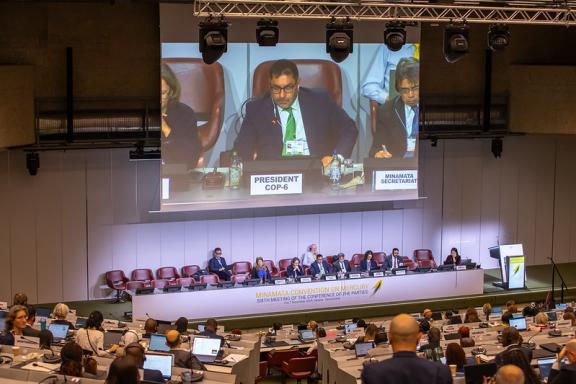COP6 decision on dental amalgam secures an equity-focused, patient-centred approach
FDI and IADR advocacy ensures extension of global phase-out date from 2030 to 2034 and inclusion of key exemption

Photo credit: Minamata Convention on Mercury (COP-6)
Geneva, 7 November 2025 — A landmark decision was reached at the Sixth Conference of the Parties (COP6) to the Minamata Convention on Mercury, where Parties agreed to set 2034 as the global phase-out date after which the manufacture, import, or export of dental amalgam will no longer be permitted. This milestone marks a major win for oral and public health and underscores the power of unified, science-based advocacy led by FDI World Dental Federation (FDI) and the International Association for Dental, Oral, and Craniofacial Research (IADR).
The final decision reflects a balanced and equity-focused approach to phasing down dental amalgam use worldwide. Crucially, it includes a key exemption that supports the joint advocacy by FDI and IADR, which ensures that even after phase-out of dental amalgam it can be used “when its use is considered necessary by the dental practitioner based on the needs of the patient.” This provision ensures that patient care remains at the centre of decision-making, safeguarding access to essential restorative treatments where alternatives are not yet available or viable.
FDI and IADR, with the support of the International Dental Manufacturers Association (IDM) and the American Dental Association (ADA), worked tirelessly to secure a balanced outcome by actively engaging in and influencing discussions throughout the negotiations. Coordinated advocacy efforts emphasized that while accelerating the phase down and eventually phasing out dental amalgam is essential, it must be achieved through an evidence-based, patient-centered, and equitable transition that is fair to all countries and considers their specific challenges and capacities.
“As we move toward the eventual phase-out of dental amalgam, it is essential that the needs of our members, and the patients they serve, remain at the heart of every decision,” said Mr Enzo Bondioni, Executive Director of FDI. “This outcome provides much-needed time and clarity for our members to plan, prepare, and implement the necessary national policies. It reinforces FDI’s commitment to supporting the global dental community in maintaining continuity of care and advancing oral health equity during this important transition”.
Over four days of intense deliberation, both organizations delivered individual and joint statements reinforcing the continued relevance of dental amalgam in restorative dentistry, while emphasizing the importance of prevention. They called for research into affordable, effective, and sustainable alternative materials and emphasized that waste management should be compulsory to reinforce the Convention’s broader objective of reducing environmental mercury exposure. These concerted efforts helped ensure that the final phase-out timeline was extended beyond 2030, the date originally proposed to 2034.
“Science and evidence must remain at the heart of every global health policy decision,” said Dr Christopher Fox, Chief Executive Officer of IADR. “This outcome reflects the progress we’ve made by investing in research into mercury-free alternatives, as called for in the text of the Minamata Convention, from both the public and private sectors. “IADR remains committed to supporting continued innovation and research that will further the rapid improvement of affordable, effective, and sustainable restorative materials, so no one is left behind in this transition”.
The decision gives Parties nine years to adapt their national strategies and healthcare systems to this new framework. This aligns closely with FDI and IADR’s long-standing position advocating for a coordinated and equity-focused phase-down that allows all countries, especially low- and middle-income nations, to strengthen capacity, build technical expertise, and ensure continuity of patient care during the transition.
By recognizing the diverse realities of healthcare delivery worldwide, the 2034 phase-out date and practitioner-based exemption together provide flexibility that avoids widening existing oral health inequalities. The Minamata Convention on Mercury, which entered into force in August 2017, now counts 153 Parties as of September 2025. The Seventh Conference of the Parties (COP7) will take place in June 2027, coinciding with the tenth anniversary of the Convention.
— ENDS —
Media Contact:
Charanjit (Chaz) Jagait, PhD, FDI Public Health, Advocacy and Communications Director
Mob.: +41 79 796 76 13; Email: cjagait@fdiworlddental.org
About FDI World Dental Federation (FDI)
FDI World Dental Federation is the leading global voice of the dental profession and envisions a world with optimal oral health. It serves as the principal representative body for over 1 million dentists worldwide. Its membership includes some 200 national dental associations and specialist groups in over 130 countries. www.fdiworlddental.org/
About International Association for Dental, Oral, and Craniofacial Research (IADR)
The International Association for Dental, Oral, and Craniofacial Research (IADR) is a nonprofit organization with a mission to drive dental, oral, and craniofacial research for health and well-being worldwide. IADR represents the individual scientists, clinician-scientists, dental professionals, and students based in academic, government, non-profit, and private-sector institutions who share our mission. Learn more at www.iadr.org.
